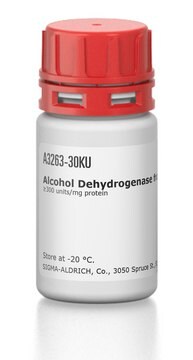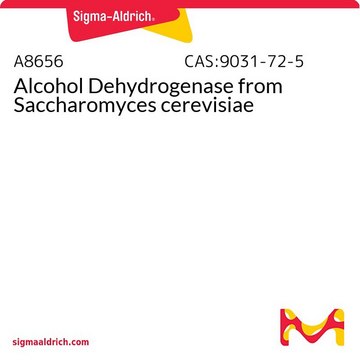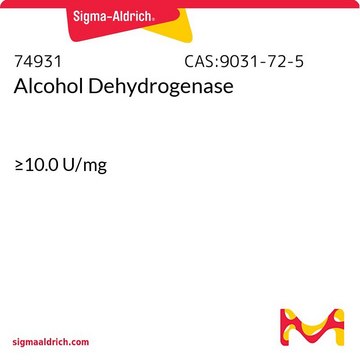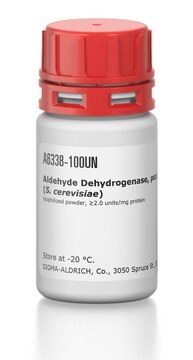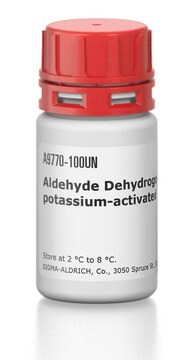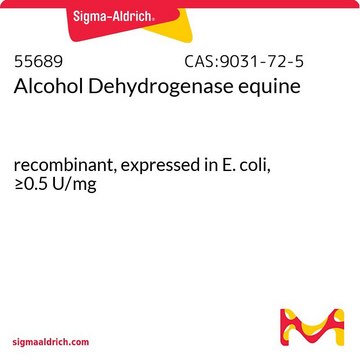A7011
Alcohol Dehydrogenase from Saccharomyces cerevisiae
≥300 units/mg protein, lyophilized powder (contains buffer salts), Mw 141-151 kDa
Synonym(s):
ADH1, Adh1p, SCAD, YDAH-1, YIM-1, ADH, Alcohol Dehydrogenase from yeast, Alcohol:NAD+ oxidoreductase
About This Item
Recommended Products
biological source
Saccharomyces cerevisiae
form
lyophilized powder (contains buffer salts)
specific activity
≥300 units/mg protein
mol wt
Mw 141-151 kDa
purified by
crystallization
storage condition
(Keep container tightly closed in a dry and well-ventilated place.)
greener alternative product characteristics
Waste Prevention
Design for Energy Efficiency
Learn more about the Principles of Green Chemistry.
sustainability
Greener Alternative Product
color
white to light yellow-brown, Light brown
optimum pH
8.6-9.0
solubility
H2O: soluble 1.0 mg/mL, clear to slightly hazy, colorless to faintly yellow
soluble
UniProt accession no.
application(s)
diagnostic assay manufacturing
greener alternative category
, Enabling
shipped in
dry ice
storage temp.
−20°C
Looking for similar products? Visit Product Comparison Guide
General description
Yeast alcohol dehydrogenase 1 (ADH1) belongs to the family of zinc-containing alcohol dehydrogenases. It is a homotetramer with each subunit containing one catalytic domain and coenzyme-binding domain.
Application
Ethanol concentration can be determined colorimentrically by monitoring the enzymatic reduction of NAD using alcohol dehydrogenase after preremoval of the aldehyde group.
Biochem/physiol Actions
Isoelectric point: 5.4-5.8
Optimal pH: 8.6-9.0
Substrates: Yeast ADH is most active with ethanol and its activity decreases as the size of the alcohol increases or decreases. Branched chain alcohols and secondary alcohols also have very low activity.
KM (ethanol) = 2.1 × 10-2 M
KM (methanol = 1.3 × 10-1 M
KM (isopropanol) = 1.4 × 10-1 M
Inhibitors: Compounds that react with free sulfhydryls, including N-alkylmaleimides and iodoacetamide.
Zinc chelator inhibitors, including 1,10-phenanthroline,
8-hydroxyquinoline, 2,2′-dipyridyl, and thiourea.
Substrate analogue inhibitors, including β-NAD analogs, purine and pyrimidine derivatives, chloroethanol, and fluoroethanol.
Extinction Coefficient: E1% = 14.6 (water, 280 nm)
Caution
Unit Definition
Physical form
Preparation Note
antibody
Storage Class Code
11 - Combustible Solids
WGK
WGK 3
Flash Point(F)
Not applicable
Flash Point(C)
Not applicable
Personal Protective Equipment
Choose from one of the most recent versions:
Certificates of Analysis (COA)
Don't see the Right Version?
If you require a particular version, you can look up a specific certificate by the Lot or Batch number.
Already Own This Product?
Find documentation for the products that you have recently purchased in the Document Library.
Customers Also Viewed
Our team of scientists has experience in all areas of research including Life Science, Material Science, Chemical Synthesis, Chromatography, Analytical and many others.
Contact Technical Service